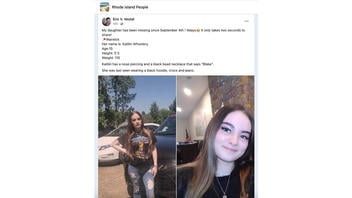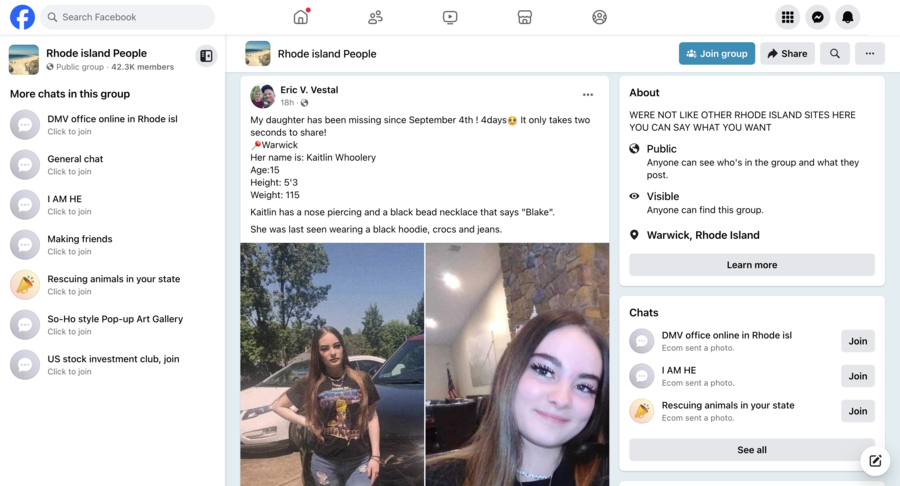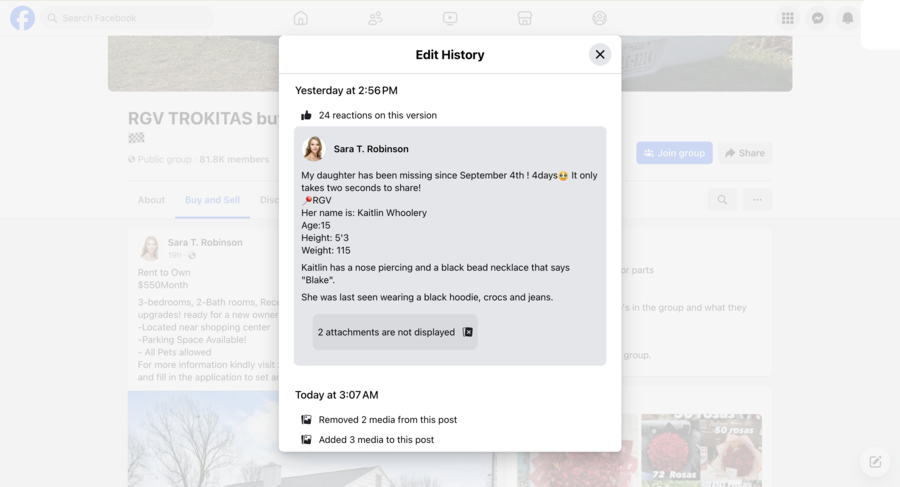
Are social media posts about a missing teenager named "Kaitlin Whoolery" authentic? No, that's not true: Whoolery died in April 2024, but posts about her disappearance were still being posted in September 2024. These posts about Whoolery are part of a "bait-and-switch" tactic commonly used on Facebook where heart-wrenching stories are swapped out for scams involving real estate ads after gaining enough likes and shares.
The claim appeared in a post in the Facebook group Rhode Island People (archived here) on September 9, 2024. The caption read:
My daughter has been missing since September 4th ! 4daysIt only takes two seconds to share!
Warwick
Her name is: Kaitlin WhooleryAge:15Height: 5'3Weight: 115Kaitlin has a nose piercing and a black bead necklace that says "Blake".She was last seen wearing a black hoodie, crocs and jeans.
This is what the post looked like on Facebook at the time of writing:
(Source: Facebook screenshot taken on Tue Sep 10 14:24:58 2024 UTC)
A reverse image search (archived here) of Whoolery showed that The Herald-Standard, a daily newspaper in Uniontown, Pennsylvania, where Whoolery lived, had reported (archived here) in December 2023 about the teenager's disappearance. At the time of the article, Whoolery had been missing since November 2023.
In April 2024, Whoolery was found dead. The Observer Reporter, a daily newspaper that serves Washington County, Greene County, and the Mon Valley in Pennsylvania, reported on the news here (archived here).
A September 9, 2024, post on Facebook (archived here) purporting to sell real estate carried the claim about Whoolery until September 8, 2024. As of September 10, 2024, the post could be found in the "RGV TROKITAS buy/Sale/Trade&parts!!!! No Rules!! 💯🏁" Facebook group. RGV is an abbreviation for Rio Grande Valley, a region in Texas.
Clicking on the three dots in the upper-right corner of the RGV post, users can see the edit history of the post. Previously, it was a copy of the post about Whoolery's disappearance. Evidence of this is below:
(Source: Facebook screenshot taken on Tue Sep 10 15:36:44 2024 UTC)
A September 2024 Lead Stories fact check of another "bait-and-switch" claim concerning another missing teen, "Seven Whiteman," was about a post on Facebook by "Eric V. Vestal," the same account that posted the Whoolery claim in the Rhode Island Facebook group. Vestal claimed that Whiteman was his daughter as well. Later, Vestal's Whiteman post was changed to a post selling real estate.
Real-estate scam postings
In a previously published August 14, 2024, fact check, which debunked a similar bait-and-switch claim, Lead Stories defined what real estate scam posts are:
Real estate scam posts are a tactic used on Facebook by spammers that employ 'bait-and-switch' content to lure people into a scam. A post's creator will pair an alarming or heart-wrenching claim with a compelling image to catch people's attention -- missing children or aging adults, injured animals, injured people in hospital beds, and sex trafficking tactics -- and drive engagement.
Once a post has garnered sufficient attention, the content switches to push a deceptive real estate advertisement. The wording and images of these eye-catching posts, typically seen on local Facebook 'yard sale' pages," are frequently identical, even when the offered property is located in different cities, regions of the U.S., or countries.
The content switch is documented by a post's edit history, which also notes additions or deletions of content. Sometimes, time stamps on the posts indicate when the switches were made, but timestamps don't change on some posts even though the content does.
Commonly, such posts use links that lead to landing pages with disclaimers or false promises and contact information requests that can be used to gather personal data, including financial information, from people who follow the trails.
Some links purport to connect people to a U.S. Housing and Urban Development site to help them search for deals on foreclosed homes. Lead Stories found that the links lead to new sites with disclosures at the bottom of the page that note they are 'not affiliated with, endorsed, authorized, or approved by the Federal Government or the US Department of Housing and Urban Development.'
Additional Lead Stories fact checks about bait-and-switch scams can be found here.



















